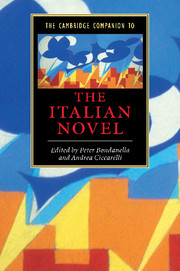Book contents
- Frontmatter
- 1 The belated development of a theory of the novel in Italian literary culture
- 2 The forms of long prose fiction in late medieval and early modern Italian literature
- 3 Alessandro Manzoni and developments in the historical novel
- 4 Literary realism in Italy
- 5 Popular fiction between Italian Unification and World War I
- 6 The foundations of Italian modernism
- 7 Neorealist narrative
- 8 Memory and testimony in Primo Levi and Giorgio Bassani
- 9 The Italian novel in search of identity
- 10 Feminist writing in the twentieth century
- 11 Italo Calvino and Umberto Eco
- 12 Literary cineastes
- 13 Frontier, exile, and migration in the contemporary Italian novel
- 14 The new Italian novel
- Index
- Series List
9 - The Italian novel in search of identity
history versus reality – Lampedusa and Pasolini
Published online by Cambridge University Press: 28 May 2006
- Frontmatter
- 1 The belated development of a theory of the novel in Italian literary culture
- 2 The forms of long prose fiction in late medieval and early modern Italian literature
- 3 Alessandro Manzoni and developments in the historical novel
- 4 Literary realism in Italy
- 5 Popular fiction between Italian Unification and World War I
- 6 The foundations of Italian modernism
- 7 Neorealist narrative
- 8 Memory and testimony in Primo Levi and Giorgio Bassani
- 9 The Italian novel in search of identity
- 10 Feminist writing in the twentieth century
- 11 Italo Calvino and Umberto Eco
- 12 Literary cineastes
- 13 Frontier, exile, and migration in the contemporary Italian novel
- 14 The new Italian novel
- Index
- Series List
Summary
The writings and biographies of Giuseppe Tomasi di Lampedusa and Pier Paolo Pasolini seem so different as to prevent any useful comparison. Yet the novels for which these two authors are best known – Pasolini's Ragazzi di vita and Una vita violenta; and Lampedusa's Il Gattopardo – have in common an identical cultural environment. In fact, while they gestated in the minds of their authors in entirely different ways, these novels were all received and reviewed by the same critical establishment and, within the span of a few brief years, launched into the same publishing marketplace. One can even say that Lampedusa's Il Gattopardo and Pasolini's Una vita violenta crossed paths, and after an almost contemporaneous first printing (the former in November of 1958, and the latter in May of 1959), the two works shared the stage at the 1959 Strega Prize ceremony, the prestigious award for the best narrative in Italy. The prize was awarded to Lampedusa's novel, while Pasolini's book took third place. Pasolini's two novels and Lampedusa's posthumous novel (the only one the Sicilian nobleman ever completed, which was approved for publication after his death) are also comparable in terms of the happy fate bestowed upon them by the larger reading public.
- Type
- Chapter
- Information
- The Cambridge Companion to the Italian Novel , pp. 136 - 150Publisher: Cambridge University PressPrint publication year: 2003



